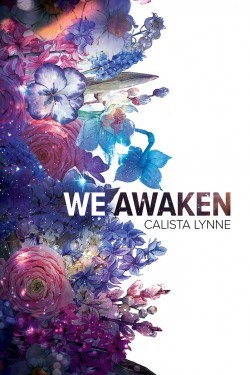 |
| Photo credit: Goodreads |
My upcoming novel We Awaken is about two female asexuals in a same sex relationship. To write these characters I did a lot of research on the ace community (which I am a member of) and spoke with people who do not feel sexual attraction, which showed me how much of a spectrum this sexuality can be. For example, one member of the main couple enjoys kissing because she finds it romantic but the other does not. One is interested in only women but the other doesn’t really take gender into account when falling for someone. People contain multitudes and asexuality is more than just a lack of sexual attraction.
Gray asexuality is for those who feel somewhere between ace and sexual—so they might feel sexual attraction rarely or only under specific circumstances. You may be thinking doesn’t everyone only feel sexual attraction under specific circumstances? That's true, except with gray aces instances of attraction are oftentimes notably rare. There can be years in between. Gray is an important label because it allows for unsurety. Sometimes, people don’t know if what they’re feeling is genuinely sexual attraction because it’s not like there’s much to compare it to. It’s great for those who have a lot in common with the asexual community but feel like the title doesn’t fit quite right.
One gray sexuality is demisexuality—when someone only feels sexual attraction after forming a close bond with another. Many individuals only have sex with people they’re close with, anyway, but demisexuality differs from this in that demisexuals literally do not feel attracted to anyone they haven’t formed strong emotional bonds with.
There is no singular definition for gray asexuality which allows it to be more inclusive. It’s for people who know they belong somewhere among the aces but aren’t quite sure where. Some have and enjoy sex, others don’t. Growing up ace or demi can be painful, and oftentimes aces feel broken. It’s especially confusing during teenage years when everyone discovers and becomes obsessed with sex while they come to terms with their own identities. It’s important that we have representation because so many people don’t know asexuality isn’t that uncommon. A lack of knowledge leads to a judgmental society.
Although I'm ace, I can only speak for the type of asexuality I experience and didn’t want to invalidate any of its varying forms. My first step was the generic googling of what I was writing, and it actually helped in understanding the basic definitions of my sexuality better, but still wasn’t enough. There's very little material on this sexuality and not a lot is firsthand. The internet was my friend yet again though, and I reached out to other members of the asexual community to hear their experiences, which I incorporated into the story.
If you have a question, ask it. Don’t be afraid to go out and seek help or do your own research because people generally want to support you. There’s that cliché of you miss 100% of the shots you don’t take but you’ll truly never know what opportunities you missed from not reaching out. Conduct interviews. Email questions. Speak to people in line at department stores. Any amount of real world experience helps.
On one more parting note in regard to being gray ace and deciding who you are: I say if a label validates you, seems to fit, and makes you happy, use it and who cares what anyone has to say.
And if my novel about ladies loving ladies sounds at all interesting to you, here’s the synopsis:
"Victoria Dinham doesn’t have much left to look forward to. Since her father died in a car accident, she lives only to fulfill her dream of being accepted into the Manhattan Dance Conservatory. But soon she finds another reason to look forward to dreams when she encounters an otherworldly girl named Ashlinn, who bears a message from Victoria’s comatose brother. Ashlinn is tasked with conjuring pleasant dreams for humans, and through the course of their nightly meetings in Victoria’s mind, the two become close. Ashlinn also helps Victoria understand asexuality and realize that she, too, is asexual.
But then Victoria needs Ashlinn’s aid outside the realm of dreams, and Ashlinn assumes human form to help Victoria make it to her dance audition. They take the opportunity to explore New York City, their feelings for each other, and the nature of their shared asexuality. But like any dream, it’s too good to last. Ashlinn must shrug off her human guise and resume her duties creating pleasant nighttime visions—or all of humanity will pay the price."
Calista Lynne is a perpetual runaway who grew up on the American East coast and is currently studying in London. She is oftentimes seen screeching at Big Ben and pointing out the same landmarks on a daily basis, and is having difficulty adjusting to the lack of Oxford commas across the pond. She writes because it always seemed to make more sense than mathematics, and has superb parents who support more than just her latte addiction. If Calista Lynne could change one thing about her life, it’d probably be her lack of ability to play both of the ukuleles adorning her rainbow bookshelves.
Twitter-sized bite:
WE AWAKEN author @calistawrites talks writing ace characters and the importance of labels on @Ava_Jae's blog. (Click to tweet)








No comments:
Post a Comment